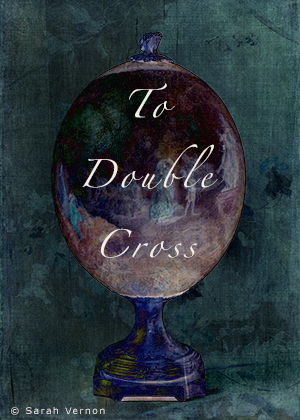Originally posted on Albert Jack (except for the image!)
To Double Cross a person (or to be ‘double crossed’) is to cheat somebody, or to betray a confidence. Initially this phrase used to mean to indicate that both parties were involved in the deception, although it is now commonly understood as applying to only one party. There is a suggestion that this expression began life in the Middle Ages when Venetian merchants (Venice being the capital of the trading world at that time) would affect allegiance to fellow Westerners by making the sign of the cross in the way Westerners did, and then show the same loyalty to Easterners by crossing themselves in the way Easterners used to. It is said that this divided loyalty led to the introduction of the term ‘double crosser’. But there is stronger evidence suggesting the expression is far more recent, being in fact a horse-racing term from the early 19th century. Any jockey who had been paid to lose an event by race fixers, but who then found himself in the lead, would cross himself twice as he passed the winning post as a prayer to God for forgiveness for his double deception by accepting the bribe to lose and then winning the race. He might also have added a third cross to pray the race fixers weren’t waiting for him when he got home for his tea.
Another possible origin for the term, and one that I prefer, relates to the doings of an 18th-century bounty hunter by the name of Jonathan Wilde. Legend has it that Wilde kept a book with the names listed of all the criminals and wanted men throughout England. He formed an underground information network and would pay or protect any criminal who provided him with information of the whereabouts of another. In this way, Wilde would apprehend and turn over wanted men to the authorities for a fee. Each of these informers had a cross placed next to their name in the book of thieves. Once a man was no longer useful to Wilde, or began to refuse to give information, the Thief Taker General would place a second cross against his name and then turn him in for the bounty money. However, Wilde also used to blackmail men to steal for him and even to murder rivals, so inevitably he was eventually double crossed himself, turned in and hanged for his crimes.


Once again a fascinating post….I like both. Creative thinking in a more devious way:) Enjoy your day. x
LikeLiked by 1 person
I have Albert Jack to thank! Happy Thursday!
LikeLiked by 1 person
Fascinating stuff Sarah! I love the Jonathan Wilde theory personally! Have you ever read an excellent historical novel by David Liss ‘A Conspriacy of Paper’ ? He appears as a sub character in that – delightfully murky doings 🙂
LikeLiked by 1 person
It’s going on my list immediately. Happy Thursday!
LikeLike
And to you! It’s raining here, bet it doesn’t do that there! 🙂
LikeLiked by 1 person
Oh, yes it does! It rained a couple of days ago. And it’s still not warm enough for me to about in a t-shirt.
LikeLike
A T-shirt – now that’s ambitious! MrH has his shorts on but it’s not a pretty sight 😦 😀
LikeLike
This is brilliant !!
LikeLiked by 1 person
Yup!
LikeLike
Wow. I learnt a lot reading this post, and it was really fascinating. Excellent as always
LikeLiked by 1 person
I’m circumspect when I reblog/press something. I don’t want to post any old tat!
LikeLike
Fantastic post. Taking note of the recommended novel too!
LikeLiked by 1 person
Well worth following his blog as well.
LikeLike
Here is to another Joyful Thursday experience with Sarah ~ wonderful creativity and story.
LikeLiked by 1 person
Thanks, Mary!
LikeLiked by 1 person